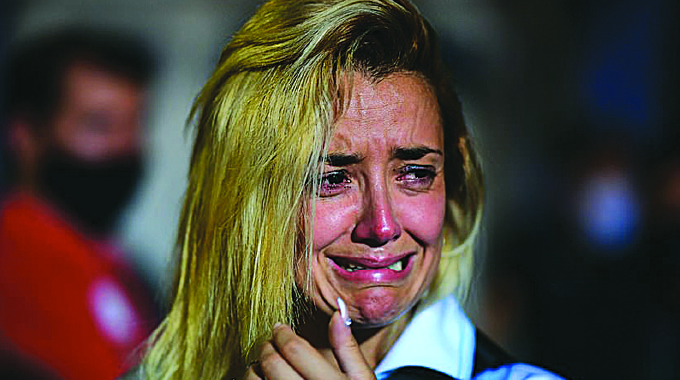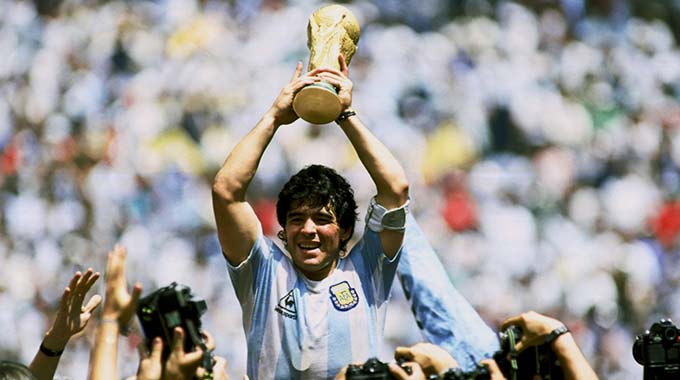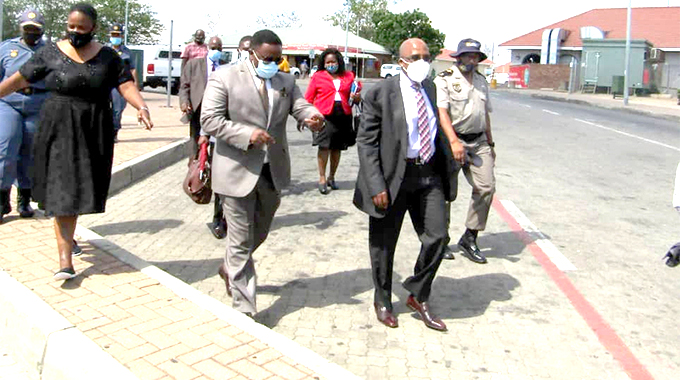SHARUKO ON SATURDAY – ‘Maradona was just a universal song, so Catholic that it was ubiquitous, stop the tambourine but the music will still be playing on.’’

Don’t Cry For Him, Argentina
THE last time I saw him was at a state-of-the-art football stadium with a name, as appropriate as any, which can be found in this game – Soccer City.
A vast and magnificent temple specifically built for football gods like him.
That was 10 years ago, during the crazy days and wild nights, of the 2010 World Cup bandwagon.
At long last, Africa was having its piece of this grand global football show, 70 years later.
And, Diego Armando Maradona — as much a human symbol of the World Cup as John Cena has become to the fantasy, and delusion, of World Wrestling Entertainment — was in town.
I had seen him earlier, during the course of that historic month, for both the game and the continent, and I had been blown away by how he looked so incredibly short.
He walked with a limp, which was probably the least of surprises, given the punishment he had suffered on these green fields where the drama of this beautiful game unfolds.
Some of it had been so savage it’s still a mystery why no one was taken to court, for such brutality, synonymous with grievous bodily harm.
His left leg appeared to have suffered most of the damage, which again wasn’t a surprise, given it was the one that used to weave all the magic and became the target for the defenders.
The one which, back in his youth, provided him with a password to escape the poverty-stricken slums of Buenos Aires’ Villa Fiorito, a place so dangerous the police have to withdraw from night patrols, for the sake of their safety,
Even taxi drivers have to think twice before daring to take you there.
That’s the area where Diego grew up, surrounded by stinking poverty, bombarded by lawlessness, suffocated by hopelessness, a place which, even today, appears to have been left behind by time, to be consumed by its demons.
To put everything into context, maybe, it’s important to turn to the experts like Guillem Balague, considered one of the most authoritative fountains of knowledge, when it comes to Spanish and Latin American football.
On a visit to Buenos Aires, earlier this year, he struggled to find a taxi driver willing to take him to Diego’s shanty neighbourhood, where Maradona grew up without running water and a sewer system.
“Eventually, I managed to persuade a very nervous taxi driver, who had picked me up on my arrival, to drive there,’’ Guillem wrote on his BBC blog to mark the 60th birthday of Maradona last month.
“We travelled in nervous silence, the houses started to be small boxes, surrounded by uneven paving with half-finished fences or filled with neglected plants.
“Rubbish bins were parked outside the tired small gardens and children were kicking a ball about barefoot.
“The street narrowed and it became an uneven dirt road, we turned right, a man was walking down the middle of the narrow road to avoid the mountains of rubble that had piled up on the pavement.
“All the plants were overgrown, there is not one sign en-route that signals the history of the area and its most famous inhabitant and there is absolutely no intention to turn it into a tourist attraction.
“Nobody likes to showcase its miseries.’’
It was also his magical left leg that took Maradona to Italy, in July 1984, on a voyage that would see him play the central figure in the conversion of a city, and a people, from outcasts, into proud winners.

Diego Maradona
There are some people in Naples, who will tell you it’s the closest thing football can offer, to religion, in terms of the redemption of a people.
To understand that, one needs to probably watch the powerful documentary by British filmmaker, Asif Kapadia, on Maradona, which premiered at the 72nd Cannes film festival, in May last year.
The people of Naples, just like their city, were a poor lot and were often mocked, as the ‘’Sewer of Italy,’’ by their counterparts in the richer, and industrialised, northern parts of the country.
That’s the poverty Diego faced, in both the city, and its football club, when he arrived there in what was then a world-record transfer from Barcelona.
“I asked for a home, I got a flat. I asked for a Ferrari, I got a Fiat,” says Maradona in the film.
But, among those poor people, in those humble surroundings, Maradona found the love he had always craved for, the perfect environment which, from his time as a kid, had provided him with the inspiration to thrive and prove a point.
By the time Diego left, after seven years at Napoli, he had inspired them to two Serie A titles, the only championships they have won in their 94-year history, a Coppa Italia, a Supercoppa and a UEFA Cup.
SOME PEOPLE ARE BORN GREAT, SOME ACHIEVE GREATNESS, DIEGO HAD GREATNESS ALL OVER HIM
Like all debates, there is always a subjectivity to the narrative and whether Diego is the greatest footballer of all-time, is something that will always split opinion, as long as humans retain their power to argue.
It’s not my mission to plunge into that debate, too many experts, with more authority than me, have said their side of the story and, just as it was, in his life and in his death, there will never be an agreement.
It’s very likely buffaloes and lions will find each other out, and sign a pact never to attack each other, before humans find agreement as to who was the greatest footballer of all-time.
My mission, today, is simply to celebrate the life of a sporting genius which our generation was lucky to watch in action, a hybrid athlete whose individual brilliance, kept bringing down the walls which used to represent the margins of human possibilities, in this game.
A man who set new benchmarks of excellence, making a mockery of the defensive coaching manuals with his movement, strength and speed of thought, always keeping himself a step ahead of the toughest of defenders, even when they came in groups of five or six.
The guy who could carry a team on his shoulders, even on the grand stage like the World Cup, dragging his teammates to find strength, in his artistry, to find light, in his golden presence and to find belief, in his great company.
They will tell you, again and again, that no man can win a World Cup, on his own, and they are probably right because, football, is a team sport.

Diego Maradonaa
What they will never tell you is that one man can impose his signature, on a World Cup, so much that without him, any discussion of that tournament turns into a sickening joke.
And, alternatively, just discussing about him, without mentioning any other person, will still provide a fitting tale of that World Cup.
Forget the infamy of the ‘Hand of God,’ and all the dark arts that it represented, a disgusting exhibition of cheating, on the big stage, as any that will ever be seen and, somehow, not be outlawed, at a World Cup.
It’s what happened next, in that Mexican sunshine at the Azteca Stadium, on June 22, 1986, before 114 580 fans, which provided a new meaning to genius, when it comes to football.
Eleven touches, in 11 seconds, of the finest exhibition of close control, graceful movement, elimination of an army of opponents as if they didn’t exist, running 68 metres and, when it mattered most, still having the presence of mind to sell a dummy to the ‘keeper.
They call it the ‘Goal of the Century’, and for a good reason too, this wasn’t football, this was vintage art, a man at the very peak of his athletic powers who, in just 11 seconds, wiggled his way into immortality.
Two more goals, including another mazy run and finish, followed in the semi-final against Belgium before, in the final against the Germans, with the score tied at 2-2, he again provided the defining moment of a classic showdown.
The ball, to send Jorge Burruchaga galloping into acres of space, down the right channel, was as much a product of pure instinct as it was of irresistible class and, from there, a World Cup was delivered.
In about a month in Mexico, Diego scored five goals, including four in the quarter-finals, and semi-finals, and provided as many assists which meant he was involved, as the scorer or the creator, of 10 of the 14 goals for his team.
When the referee blew to end the final, he slumped onto the floor, raised his arms and let the television commentators provide the motion picture soundtrack.
“There are some athletes so gifted, so commanding, they can lift a team even in an entire sport to an extraordinary level of accomplishment, sometimes they carry a whole nation,’’ said the commentator.
“Diego Maradona is such an athlete.
“On this day, June 29 1986, Diego Armando Maradona has reached the peak and attained immortality.’’
Local journalist, Hope Chizuzu, probably put it even better on our interactive group of African football journalists and administrators.
“Maradona was just a universal song, so Catholic that it was ubiquitous,’’ said Chizuzu. “Stop the tambourine but the music will still be playing on.’’
IN TRUE EVITA FASHION, DON’t CRY FOR MARADONA, ARGENTINA
Diego reinvented football and, unknowingly, cleared the path for the likes of Messi and Cristiano to get the protection they get today.
Messi and Cristiano can now extend their careers, well into the mid-or-late 30s, because Diego helped to change the game.
He influenced it to find its conscience to dump its violence, in which the likes of the “Butcher of Bilbao,’’ Andoni Goecochea, used to thrive under, earning a living breaking bones and limbs.
The horrendous tackle on Maradona, in September 1983, was so bad that some media organisations described it as an assassination attempt on the Argentine forward.
Rules were changed to protect the magicians, as the game finally came to its senses with those who made the rules finally accepting that the repeated brutality, inflicted on Diego, was an insult to the values of everything football should represent.
Because of Diego, football our game found a way to cull its savage instincts and, in doing so, halted its slide into some form of rugby-ball.
Of course, it came at a huge personal cost for Diego.
Some of the substances they used to inject into him, just to get him onto the pitch, ended up playing a role in pushing him into the darkness of drug abuse.
Maybe, it was his fate, but whatever the case, it’s very unlikely football will get a more passionate servant of his country like Diego.
He redefined the role of what it means to represent your country, your people, to love one’s nation, to fly one’s flag on a football pitch and win games, and trophies, for a cause far much bigger than himself.
That Argentina had been cruel to his father, who worked endless hours to feed a family of eight, living in the most horrible of conditions, didn’t matter to him.
Once he got his chance to represent his country, its internal struggles, where the rich were filthy wealthy, and the poor were incredibly impoverished, didn’t matter at all.
All he wanted was to unite them, in finding pride in who they were, to show them they could conquer the world and, boy oh boy, he did a great job.
In the process, he became Argentina, and Argentina became him, and that is the reason why this country will never cry for anyone more than it’s doing for its Diego.
To them, he was the most human of immortals – so many flaws, just like most of them, so many gifts, unlike most of them – the icon God gave them as his ultimate present to their country.
By the time I last met him, in that media conference at Soccer City after his team’s 3-1 win over Mexico, his international football career had ended 16 years earlier, in disgrace.
Sent off from the ‘94 World Cup, after failing a drugs test, others who didn’t have Diego’s never-say-die spirit, would have drifted away from the scene to try and escape the relentless criticism of an unforgiving world.
We have seen that with Neil Armstrong, Ben Johnson, Marion Jones, to name but a few, but not Diego, their Armando, our Maradona.
If I had known that he would be gone, just 10 years down the line, I would probably have asked him how he would want Argentina to react when that finally happened.
And, it’s very likely, he would have turned to another icon of Argentina, Eva Peron who, like him, grew up in stinking poverty but found a way to become an influential First Lady of the country.
He would probably have chosen to sing, in his response, borrowing the lyrics from Madonna’s song, “Don’t Cry For Me Argentina,” the soundtrack of the play Evita, which depicts the life of Eva Peron.
Here, I have just changed its lyrics, a bit, to fit what Diego would probably have sung for me.
“It won’t be easy, you’ll think it is strange
When I try to explain how I feel
That I still need your love after all that I’ve done
“You won’t believe me
All you will see is a boy you once knew
Although he’s now dressed up for the heavens
At sixes and sevens with you
“I had to let it happen, I had to change
Couldn’t stay all my life down at heel
Looking out of the window, staying out of the sun
“So, I chose freedom
Running around, with a ball, trying everything new
But, nothing impressed me at all
I never expected it to
“Don’t cry for me Argentina
The truth is I never left you
All through my wild days
My mad existence
I kept my promise
Don’t keep your distance
“And as for fortune, and as for fame
I never invited them in
Though, it seemed to the world, they were all I desired
“They are illusions
They are not the solutions they promised to be
The answer was here all the time
I love you and hope you love me
“Don’t cry for me Argentina
“Have I said too much?
There’s nothing more I can think of to say to you.
But all you have to do is look at me to know
That every word I said is true and every goal was for you.’’
To God Be The Glory!
Peace to the GEPA Chief, the Big Fish, George Norton and all the Chakariboys in the struggle.
Come on Warriors!!!!!!!!!!!!!!!!!!!!!!!!!
Khamaldinhoooooooooooooooooooo!
Text Feedback — 0772545199
WhatsApp — 0772545199
Email – [email protected]; [email protected]
You can also interact with me on Twitter — @Chakariboy, Facebook, Instagram — sharukor and every Wednesday night, at 9.45pm, when I join the legendary Charles “CNN’’ Mabika and producer Craig “Master Craig’’ Katsande on the ZBC television magazine programme, “Game Plan”.









Comments